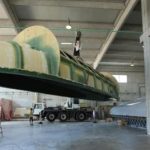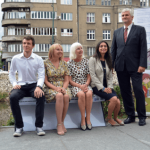As Poslovni Dnevnik/Bernard Ivezic writes on the 1st of December, 2019, the Croatian software company GDi Group has assembled an international consortium comprising the US corporation ESRI and the German satellite company European Space Imaging, and in Albania, in coordination with the government there, the software is assisting local authorities in Durres in its search and rescue operation.
The company’s engagement is free, which makes the action launched by the Croatian software company GDi the largest CSR project that a Croatian company has done on a global level.
Durres, an Albanian city on the Adriatic coast 300 kilometres from Croatia’s southernmost city of Dubrovnik, was hit by two terrible earthquakes in the early hours of Tuesday, November the 26th, after which ground tremors continued and were felt throughout Dalmatia. So far, more than 500 minor earthquakes have been reported.
The Albanian earthquake has claimed 50 lives so far and 790 people were injured to some extent or another. The UN has sent its team to Albania, and Andrej Lončarić, a board member of the Croatian software company GDi, who is coordinating the action with colleagues from Tirana and Zagreb, says they have donated geoinformatics (GIS) applications.
“Our team of seven people in Tirana and Zagreb, together with partners, is working with teams out in the field to give those affected and their rescuers a better overview of the current situation,” says Lončarić.
With the help of American and German companies mentioned above, the Croatian software company GDi has created fresh maps of Albania. The first donated application, “Sherbimet per Ndihmen e Shpejte” (Emergency Services), is a map of the nearest hospitals and emergency services. It is being updated in coordination with the local authorities there and is currently being claimed to be more relevant source of information than Google Maps itself.
The second application “Raporto Demet nga Termeti 26 Nentor 2019” (Earthquake Damage Report) is a claim form. Citizens can immediately send photos of structures, mark a location on the map, leave contact information and other information.
“The applications are not commercial and branded, they are in Albanian,” says GDi’s Andrej Lončarić, explaining that the apps work on all smartphones and that their promotion via social media has been extremely helpful.
He states that in the first application, in cooperation with the Albanian authorities, they entered more than 40 locations of hospitals and emergency services, while in the second, 864 claims were filed by the citizens themselves by Sunday. This second application, which operates on the principle of crowdsourcing, has also become the most complete source for the current state of damage in Durres and the surrounding area and is used by local services and the Albanian Government.
They also created a third donated app, a dashboard that gives a macro view of all logins and statuses in the field, to evaluate further actions, such as whether reportedly damaged structures will be able to be repaired or will have to be demolished. Lončarić says the action is still ongoing, they’re adding other applications for which there is a need, such as their fourth application, a kind of digital cartographic picture book “Evidento Dëmet nga Tërmeti” (Earthquake damage viewer), where the situation before and after the earthquake can be seen, and where the damaged structures are marked clearly with red dots.
In Croatia, the civil protection of the Republic of Croatia, the Office for Emergency Situations in Zagreb, firefighters and other such services already have such software capabilities.
In 2014, this Croatian software company created a similar application donation action in Bosnia and Herzegovina and Serbia when floods caused enormous issues, and during summer in Dalmatia when a series of devastating fires broke out. Similar help in the digital world is provided by the Giscloud company in Zagreb, which, in Fiji, helped a non-profit organisation optimise their donations of water filters through the mapping of drinking water sources.
The number of Croatian companies and entrepreneurs working to address the serious problems facing communities around the world has increased in recent years.
From Nenad Bakić, who, through IRIM, encourages the development of STEM education in Croatia and throughout the region, through the ACT Group and Brodot who support social entrepreneurs, to a whole new generation of entrepreneurs in the area, who, in addition to profitability, care about the impact their products and services will have on the community.
Make sure to follow our dedicated Made in Croatia page for much more.









